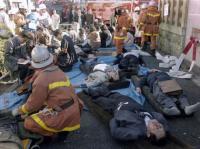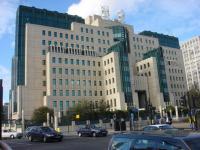-
Four questions Belgians should ask about the Patriot Act

The Paris and Brussels terrorist attacks added a sense of urgency to calls for Belgium to enact its own counterterrorism bill. It is a call the French government has already answered. Increased use of surveillance is a worldwide trend. There is no guarantee, however, that even with the most sophisticated surveillance technology out there today, passing a bill or law to collect private information on citizens will protect us from terrorist threats and violence. Even more vexing: the nature of intelligence gathering means we may never know exactly how many attacks have been prevented by the Patriot Act, the French surveillance law — or a similar law that Belgium may soon pass.
-
-
Do gun-restriction laws help reduce gun deaths?
Researchers looked at the associations between firearm-related laws and firearm homicides, suicides, and unintentional injuries and deaths. The study is the first to explore the evidence from around the world on gun laws and gun violence to determine whether gun restrictions help reduce gun deaths. While the research did not conclusively prove that restrictions, or relaxation of laws, reduce gun deaths, the results indicate that gun violence tended to decline after countries passed new restrictions on gun purchasing and ownership.
-
-
Montenegro expels 58 members of Japanese doomsday cult Aum Shinrikyo

Montenegro has expelled fifty-eight foreigners, all members of the Japanese doomsday cult Aum Shinrikyo which, in March 1995, launched a deadly nerve gas attack on Tokyo’s underground. Twelve people were killed and thousands injured in Aum Shinrikyo’s nerve gas attack on a Tokyo commuters.
-
-
Flexible security solution makes life difficult for burglars
Ideally, homeowners want to be warned if a burglar sneaks onto their property, and farmers want to know if horses or sheep are no longer in the paddock or field they were left grazing in. Experimental physicists at Saarland University have developed a flexible security solution that can be used in gardens, driveways, business premises, or on grazing land and in woodland.
-
-
Proposed bill would ban “burner” phones in the U.S.

Much of the recent debate revolved around terrorists using devices with end-to-end encryption. The terrorists who perpetrated the 13 November 2015 attacks in Paris used several encrypted phones – but three of them also used burner phones, concealing their communications by not having the owners’ names associated with the phones they used. Representative Jackie Speier (D-California) has proposed a bill which would ban burner phones in the United States.
-
-
U.K. could lose access to terrorism, crime databases if it leaves the EU: Europol

Rob Wainwright, the director of the EU’s police agency Europol, said that if Britain left the EU, it could lose access to important databases of terror and criminal suspects needed to fight ISIS. Wainwright said databases provided “daily” benefit to UK police in protecting borders. Leaving the EU would put intelligence cooperation in danger, he said.
-
-
Ted Cruz: Cancelled NYPD’s Muslim surveillance program could prevent terrorist attacks
Presidential candidate Ted Cruz criticized New York Mayor Bill de Blasio for shutting down the NYPD’s Muslim surveillance program. In the wake of the Brussels terrorist attacks, Cruz. suggested that to prevent such attacks in the United States, the police should patrol Muslim communities more heavily – and offered the NYPD program as an example of how such surveillance should be done. In 2014, the New York Police Department acknowledged that its surveillance program did not lead to any terror investigations. Police were not able to find a single lead.
-
-
Blacks believe police view them as “suspects first, civilians second”: Study
Most of the Ferguson protestors believed police view black people as worthless thugs and white people as innocent and superior — perceptions which, true or not, affect police-community relations in an era of persistent racial strife. “The protestors did not view police brutality and discrimination as an isolated phenomenon,” says a the researcher who conducted interviews with the protesters. “Rather, they believed that it’s reflective of broader social inequality and discrimination in society at large.”
-
-
Better tracking of police homicides
Official counts of homicides by police seriously undercount incidents, according to a study, but a relatively new national data system, currently in use in thirty-two states, could be a crucial tool for gathering more comprehensive information, say the researchers.
-
-
Three gun-safety laws in effect in some states could significantly reduce gun deaths
A nationwide study which analyzes the impact of gun-control laws in the United States has found that just 9 of 25 state laws are effective in reducing firearm deaths. The research suggests that three laws implemented in some states could reduce gun deaths by more than 80 percent if they were implemented nationwide. Laws requiring firearm identification through ballistic imprinting or microstamping were found to reduce the projected mortality risk by 84 percent; ammunition background checks by 82 percent; and universal background checks for all gun purchases by 61 percent. Nineother states laws — such as the so-called “Stand your Ground” laws — were associated with increased mortality.
-
-
Social media used to assess damage caused by natural disasters
A new study concludes that it is possible to determine the damage caused by a natural disaster in just a few hours by using data from social networks. “Twitter, the social network which we have analyzed, is useful for the management, real-time monitoring and even prediction of the economic impact that disasters like Hurricane Sandy can have,” says one of the researchers.
-
-
U.K. to destroy biometric information of 45 terror suspects due to botched paperwork
British security agencies will have to destroy fingerprints and DNA of forty-five terror suspects because the police retained the biometric samples longer than the law allows. The law does allow the police to keep biometric information of terrorism suspects indefinitely, but certain paperwork must be completed within a certain period of time to allow that, and if the paperwork is not completed, the samples must be destroyed. A new report reveals that Britain holds biometric information and materials on nearly 8,000 suspects.
-
-
Pastor leading prayers at a Trump rally says Sandy Hook school massacre was a hoax
Carl Gallups an evangelical pastor who led prayers at a Donald Trump campaign rally, has been a Sandy Hook “truther,” claiming that the school massacre never happened and that the parents of the child victims were “Hollywood actors” hired by the Obama administration to help promote gun safety laws.
-
-
Refined interview technique can reveal terror plots
An interview technique for eliciting intelligence without asking questions has in a series of experiments proven to work very well. The idea dates back to the renowned Second World War interrogator Hanns Scharff, but has now, for the first time, been empirically validated. The technique can help intelligence agencies reveal plans of future terrorist acts.
-
-
EUROPOL: 3,000-5,000 ISIS-trained jihadi fighters living in Europe
EUROPOL director Rob Wainwright warned ISIS is planning more attacks in Europe. Europol estimates that there are between 3,000 and 5,000 international fighters who returned to Europe from Syria. “The growing number of foreign fighters is presenting EU countries with completely new challenges,” Wainwright said.
-
More headlines
The long view
How Male Grievance Fuels Radicalization and Extremist Violence
By Haily Tran
Social extremism is evolving in reach and form. While traditional racial supremacy ideologies remain, contemporary movements are now often fueled by something more personal and emotionally resonant: male grievance.
